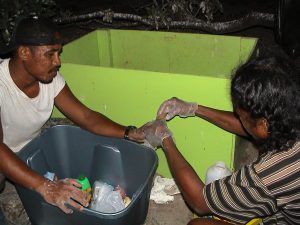The Return of Turtles on Helen Reef Atoll
Hatohobei or Tobi, is a remote island in the Pacific, the southernmost of Palau’s 16 states, consisting of Hatohoebi island and Helen Reef. The nearest island and town, Koror (capital of Palau) is almost 400 miles northeast of Tobi. Helen Reef is a large biologically diverse coral reef atoll located about 40 miles east of Tobi island and is one of the Pacific’s most outstanding atolls in terms of its area, ecological integrity, abundance of marine life, and biological diversity. Helen Reef is important to the people of Hatohobei for their cultural identity and for subsistence fishing. 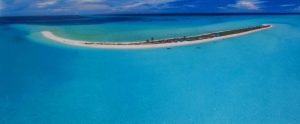
OneReef’s partnership with the Tobi community to support their conservation efforts for Helen Reef was the very first community partnership for OneReef and it sparked partnership agreements with other island communities in the region. This year marks 10 years of a successful long-term partnership between OneReef and the Tobi community. We asked Rosania Victor, the Program Manager to share a success story with us.
The Tobi community is celebrating the increase in turtle populations on Helen Reef Atoll. The Helen Reef Rangers began 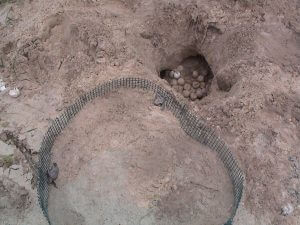 their turtle monitoring and tagging program 16 years ago. Based on the data collected so far, new and returning turtles continue to nest on Helen Reef Atoll. The turtles who come to shore are tagged by the rangers after they have laid their eggs. This allows them to monitor, observe, and record “returning” turtles versus new turtles who are found nesting on th
their turtle monitoring and tagging program 16 years ago. Based on the data collected so far, new and returning turtles continue to nest on Helen Reef Atoll. The turtles who come to shore are tagged by the rangers after they have laid their eggs. This allows them to monitor, observe, and record “returning” turtles versus new turtles who are found nesting on th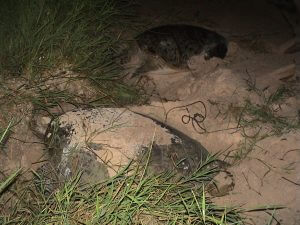 eir shore. Rangers have also helped turtle recovery by improving survival rates. Normally 50% of the baby turtles get eaten by sand crabs and birds. On Helen Reef, the rangers protect the nest from predators by putting a fence around it. Once hatched, the rangers rake leaves to the water to help them hide from big predators. These efforts are paying off in boosting turtle numbers. In 2019, upwards of one hundred nesting turtles were recorded on Helen Reef Atoll, a significant increase versus 2018.
eir shore. Rangers have also helped turtle recovery by improving survival rates. Normally 50% of the baby turtles get eaten by sand crabs and birds. On Helen Reef, the rangers protect the nest from predators by putting a fence around it. Once hatched, the rangers rake leaves to the water to help them hide from big predators. These efforts are paying off in boosting turtle numbers. In 2019, upwards of one hundred nesting turtles were recorded on Helen Reef Atoll, a significant increase versus 2018.
At Helen Reef atoll, there are four rangers (one senior ranger and three active rangers) to man the station. Their major duties are to carry out routine patrols, implementing surveillance and deterrence activities on and around Helen Reef, 24/7 during the 3-4 months rotation period. Part of their duties is to regularly collect data on natural resources such as marine turtles and birds. Data collected is reported to the main office in Koror via SSB radio (ICOM-single sided band radio), twice a day. 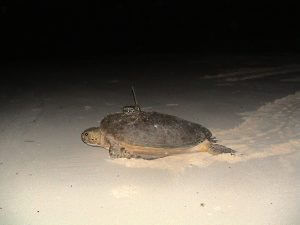
Being a Ranger at Helen Reef is a challenging and isolating assignment. Helen Reef is a small sandy bar island with very little vegetation. An additional challenge is the climate change effects that have resulted in unusually hot weather, infrequent rain, coastal erosion, fewer big trees, strong current, etc. Food supplies mainly arrive from Koror on a private vessel chartered by the Hatohobei State Government on regularly conducted trips. The Helen Reef main office in Koror ensures that essential and basic needs including fuel for enforcement continue to resupply the Helen Reef ranger station. However, the safety of the rangers remains a concern because they are so far from Koror and any immediate help.
Despite these challenges and risks the rangers remain motivated and excited about their turtle tagging and monitoring work at Helen Reef and also the surveillance and patrolling they conduct around the reef. Based on the surveillance data, there are no illegal poachers at Helen Reef since the last incident in 2014! The enforcement program at Helen Reef has been very successful in deterring poaching and as a result, the reef has shown remarkable increases in the abundance and size of key fish species.
